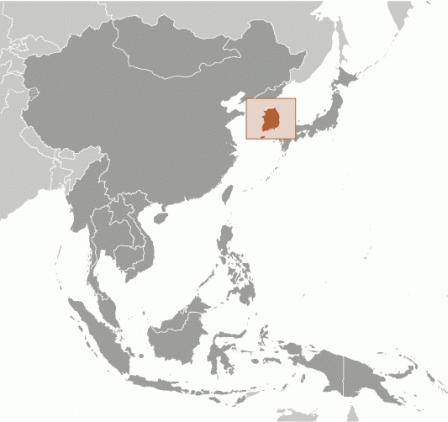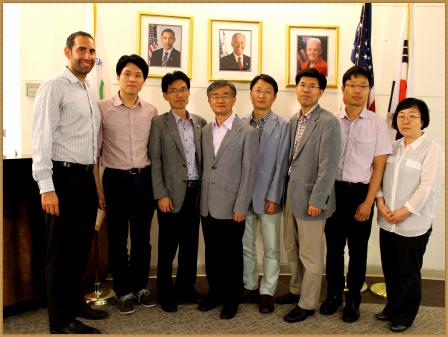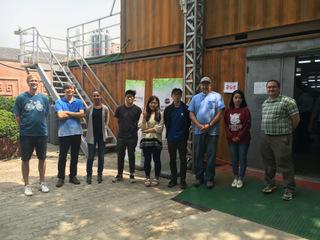EPA Collaboration with South Korea

The U.S. Environmental Protection Agency is involved in a range of activities with South Korea to protect public health and the environment. The major driver of collaborative activities today is an Environmental Cooperation Agreement under the Korea-United States Free Trade Agreement which entered into force in March 2012. Through this mechanism, EPA, the Ministry of Environment of Korea, Exit and partner agencies in both countries cooperate to strengthen environmental governance, improve air and water quality, and reduce exposure to toxic chemicals.
- Agreement between the United States of America and the Government of the Republic of Korea on Environmental Cooperation (PDF) (2012) (8 pp, 2.06 M, About PDF)
- Memorandum of Understanding Between the Environmental Protection Agency of the United States of America and the Environment Administration of the Republic of Korea (predecessor to the Ministry of Environment) (1987)
Explore our work in South Korea:
- Building Strong Environmental Institutions and Legal Structures
- Improving Air Quality
- Expanding Access to Clean Water
- Reducing Exposure to Toxic Chemicals
Building Strong Environmental Institutions and Legal Structures
 Korean officials worked with EPA and other U.S. agencies to suggest revisions to South Korea's environmental impact assessment system.
Korean officials worked with EPA and other U.S. agencies to suggest revisions to South Korea's environmental impact assessment system.In 2014, EPA hosted officials from the Korea Maritime Institute and other organizations on Strategic Environmental Assessment (SEA), organizing presentations from EPA offices and from agencies across the U.S. government to exchange information on environmental impact assessment, strategic environmental assessment, and other evaluation systems. The study tour compared the U.S. and Korean systems, and this contributed to recommendations for potential revisions to Korea’s environmental impact system.
In addition, EPA has shared case studies on techniques to handle conflicts with the Anti-Corruption and Civil Rights Commission of Korea. ExitThese case studies informed efforts to address disagreements caused by environmental policy and development. EPA has also discussed administrative appeals processes with Korea’s Central Administrative Appeals Commission.
Improving Air Quality
 EPA and Korean researchers at the Olympic Park air quality monitoring site in Seoul, South Korea. Measurements will be combined with other observations to improve understanding of air quality in East Asia.
EPA and Korean researchers at the Olympic Park air quality monitoring site in Seoul, South Korea. Measurements will be combined with other observations to improve understanding of air quality in East Asia.The Korea-United States Air Quality Study (KORUS-AQ) is an international, multi-organization mission to observe air quality across the Korean peninsula and surrounding waters. EPA is working with the U.S. National Aeronautics and Space Administration (NASA), the Korean National Institute of Environmental Research, and others to integrate observation from satellites, aircraft, and ground sites with air quality models to better understand the factors controlling air quality across urban, rural and coastal boundaries in East Asia. EPA is providing expertise in ground-based measurements.
EPA participated in a Roundtable on Transboundary Air Pollution in Northeast Asia in April 2014. The meeting was hosted by the Ministry of Environment in Seoul. EPA delivered a presentation on the history and implementation of the United States-Canada Air Quality Agreement, sharing U.S. experiences as attendees considered regional initiatives to address transboundary air pollution and its implications. EPA has also hosted delegations on air emission trading programs, ports and vessels emissions assessment and reduction strategies, and radiation regulations.
Learn more:
Expanding Access to Clean Water
South Korea hosted the 7th World Water Forum in April of 2015, an international water event held every three years. EPA presented on best practices, tools, and products at the expo’s USA Pavilion which EPA co-sponsored.
EPA has hosted several delegations and meetings with South Korean officials pertaining to safe drinking water. In 2015, EPA organized an informational meeting with a delegation of federal and municipal officials from the South Korea Han River Basin on EPA’s drinking water and watershed protection policies through the Clean Water Act and Safe Drinking Water Act. In 2014, EPA met with officials on policy and programs on non-point source pollution, conservation practices, and urban stormwater and agricultural runoff. EPA officials have also participated in an annual Korea-hosted symposium on aquatic ecosystem health monitoring.
Reducing Exposure to Toxic Chemicals
In September 2014, EPA experts co-facilitated an International Seminar on Perfluorinated Compounds (PFCs), hosted by the Ministry of Environment in Seoul. EPA presented on different aspects of the management of PFCs and the Stockholm Convention. EPA has also recently hosted visiting delegations to share EPA’s experiences in PFC management, Superfund and systems used to track site cleanup activities and progress, recycling of mercury-containing substances, and remediation of soil and groundwater pollution.
